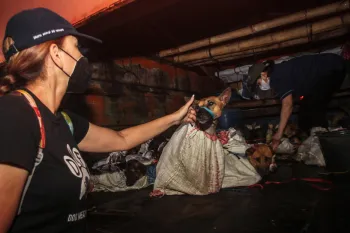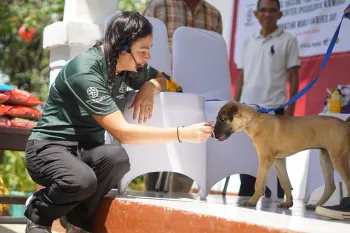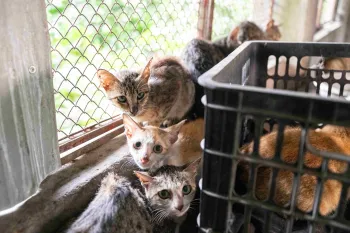We continue to advance high-level action and advocacy to end the dog and cat meat trades in Indonesia as part of the Dog Meat Free Indonesia coalition: Three legislative proposals have been submitted this week by DMFI’s lawyers to the country’s parliament that, if voted into law, would transform protections for companion animals.
Dog Meat Free Indonesia is an alliance of local and international organizations that works to expose the cruelty of the dog and cat meat trades and push for legal reforms. I am so proud that Humane Society International is a founding member of this powerful coalition, which has already succeeded in securing directives to end the dog and cat meat trades in more than 70 cities, regencies and provinces across Indonesia—including Jakarta. Without a national ban, however, enforcing a patchwork of local and regional bans remains a challenge, and the trades cannot be fully eradicated. If passed, these DMFI-crafted regulations would be Indonesia’s first-ever laws dedicated to the protection of companion animals and would make Indonesia the sixth nation in Asia to explicitly ban the dog and cat meat trades.
And full eradication of these cruel and dangerous trades is what the Indonesian people want. A 2021 opinion poll revealed that 93% of Indonesians support a national dog meat ban. Fewer than 5% had ever even consumed dog meat, and 88% agreed that the issues of the dog meat trade and consumption of dog meat need to be addressed immediately by all political parties.
Dog Meat-Free Indonesia/Dog Meat-Free Indonesia
Blog Inline CTA: Indonesia’s dog and cat meat trades
Last month, I told you about some of our work to raise public awareness about the dangers of the dog and cat meat trades in East Nusa Tenggara, Indonesia. In some parts of the country, there has been a significant increase in rabies cases in people, a serious health issue perpetuated by the dog meat trade. The dog thieves indiscriminately snatch dogs off the streets, with no awareness of their rabies vaccination status. These terrified dogs are then packed tightly together on transport trucks, increasing the likelihood of disease spread. In the frightening struggle of capture, caging, loading and unloading, it is all too easy for any number of people in the supply chain to get bitten by an infected dog. One of the proposed laws recognizes the urgency of fighting this entirely preventable yet deadly disease through tackling this trade.
Using the rule of law to come down harder on cruel and abusive industries is one of our signature tactics in advocating for animals around the world. Having recently succeeded in getting a legislative ban on the dog meat industry passed in South Korea’s National Assembly, and with Indonesia’s president Prabowo Subianto newly elected to office, we believe now is the right time for Indonesia to protect both its people and its animals by advancing these regulations and passing them into law.
Under the proposed law it would become illegal to catch, transport or slaughter dogs and cats for consumption and to store, pack, process, distribute or sell their meat either through traditional or online markets. This would be coupled with a national law to criminalize a broad array of cruel acts against companion animals, enshrining in law the principles of responsible pet guardianship as well as establish an animal welfare committee to advise on the formulation and implementation of animal welfare laws, among other duties.
The law would also prohibit the stealing, catching, breeding, trafficking, selling or slaughtering of dogs and cats for human consumption as well as selling dog and cat meat for such purposes.
Importantly, too, a proposed Presidential Regulation seeks to highlight the fact that rabies is a priority zoonotic disease endemic in 26 Indonesian provinces, with clearly established links to the dog meat trade. This law would support Indonesia’s One Health Roadmap to eliminate the disease in humans nationwide by 2030 by establishing a legal task force to directly tackle the dog and cat meat trades.
This groundbreaking suite of proposals would significantly strengthen Indonesia’s national laws, which currently are too weak to afford animals the legal protection they need. If approved, and following a public hearing, a ban on the dog and cat meat trades could be in place within five years.
Once again, concern for animals is becoming recognized all over the world as a serious and urgent issue, one inextricably linked to the health and well-being of people. Such a movement toward a more caring, compassionate world is what we all need.
Follow Kitty Block @HSUSKittyBlock.




